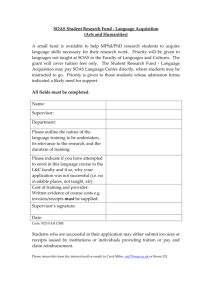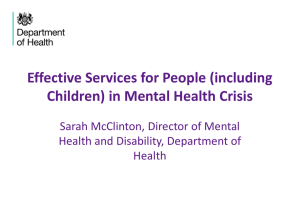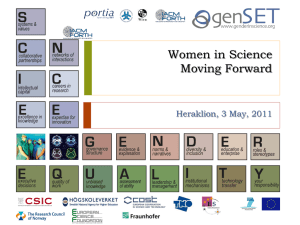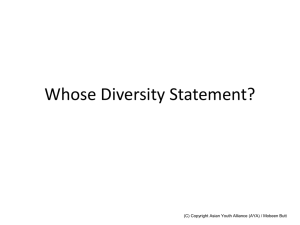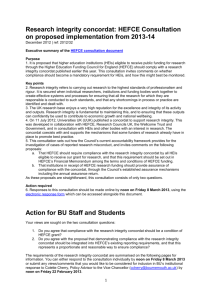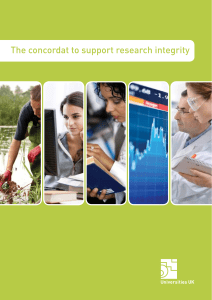HR Excellence in Research Badge: Two
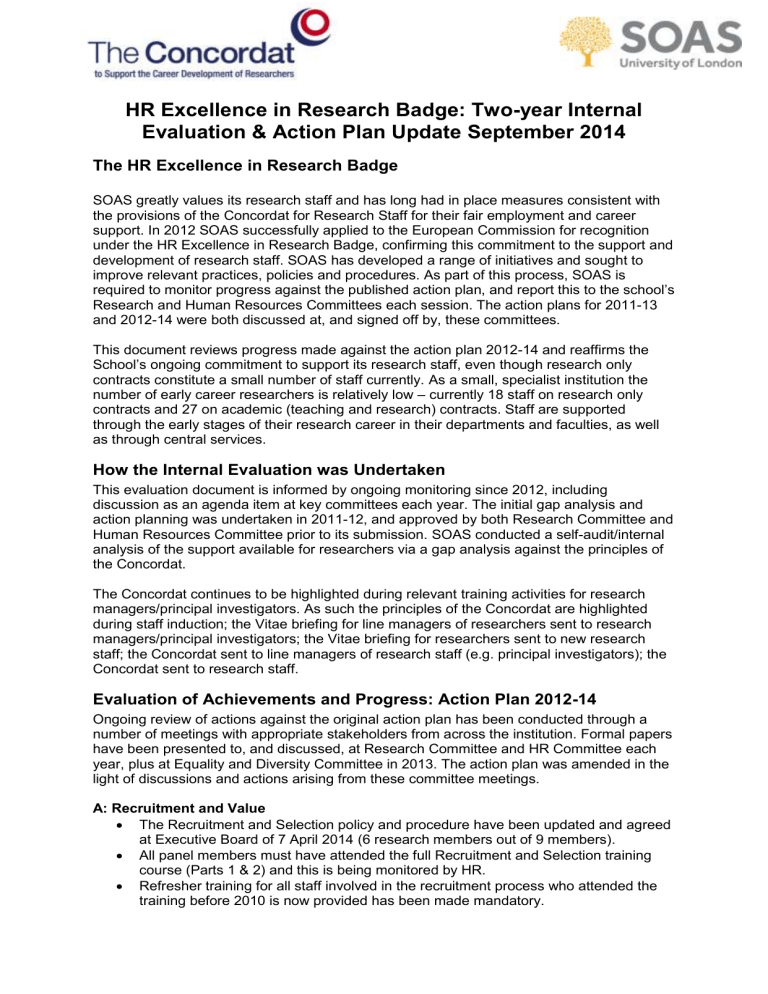
HR Excellence in Research Badge: Two-year Internal
Evaluation & Action Plan Update September 2014
The HR Excellence in Research Badge
SOAS greatly values its research staff and has long had in place measures consistent with the provisions of the Concordat for Research Staff for their fair employment and career support. In 2012 SOAS successfully applied to the European Commission for recognition under the HR Excellence in Research Badge, confirming this commitment to the support and development of research staff. SOAS has developed a range of initiatives and sought to improve relevant practices, policies and procedures. As part of this process, SOAS is required to monitor progress against the published action plan, and report this to the school’s
Research and Human Resources Committees each session. The action plans for 2011-13 and 2012-14 were both discussed at, and signed off by, these committees.
This document reviews progress made against the action plan 2012-14 and reaffirms the
School’s ongoing commitment to support its research staff, even though research only contracts constitute a small number of staff currently. As a small, specialist institution the number of early career researchers is relatively low – currently 18 staff on research only contracts and 27 on academic (teaching and research) contracts. Staff are supported through the early stages of their research career in their departments and faculties, as well as through central services.
How the Internal Evaluation was Undertaken
This evaluation document is informed by ongoing monitoring since 2012, including discussion as an agenda item at key committees each year. The initial gap analysis and action planning was undertaken in 2011-12, and approved by both Research Committee and
Human Resources Committee prior to its submission. SOAS conducted a self-audit/internal analysis of the support available for researchers via a gap analysis against the principles of the Concordat.
The Concordat continues to be highlighted during relevant training activities for research managers/principal investigators. As such the principles of the Concordat are highlighted during staff induction; the Vitae briefing for line managers of researchers sent to research managers/principal investigators; the Vitae briefing for researchers sent to new research staff; the Concordat sent to line managers of research staff (e.g. principal investigators); the
Concordat sent to research staff.
Evaluation of Achievements and Progress: Action Plan 2012-14
Ongoing review of actions against the original action plan has been conducted through a number of meetings with appropriate stakeholders from across the institution. Formal papers have been presented to, and discussed, at Research Committee and HR Committee each year, plus at Equality and Diversity Committee in 2013. The action plan was amended in the light of discussions and actions arising from these committee meetings.
A: Recruitment and Value
The Recruitment and Selection policy and procedure have been updated and agreed at Executive Board of 7 April 2014 (6 research members out of 9 members).
All panel members must have attended the full Recruitment and Selection training course (Parts 1 & 2) and this is being monitored by HR.
Refresher training for all staff involved in the recruitment process who attended the training before 2010 is now provided has been made mandatory.
Training material has been reviewed and additional material on Unconscious Bias added.
B: Recognition and Value
Further work still to be done on communicating and formalising information to research managers on what is expected of them and what support is available, although the Research Office has a clearer idea of what this should look like.
The automated end of fixed term contract process sending reminders to the managers of research staff. The end of fixed term process includes discussion on redeployment and career development.
Participation in the School’s Staff Development and Review scheme is compulsory after the completion of probation. Part 3 looks specifically at career and development planning. Participation rates will be reported to HR Committee.
Further training courses to support PIs in the management of grants in relation to finances and people still to be developed, but there is a plan to achieve this.
A clear and automated process is in place for probation for staff on contracts of at least 6 months. Shorter contracts fall within the Employment of casual Staff Policy.
C: Support and Career Development
All new research staff receive a welcome pack of materials outlining what support is available to them. They are also invited to attend the institutional New Staff
Orientation programme as an introduction to the School, to Equality issues and
Information Compliance.
Where local (unofficial) mentoring arrangements are not in place, research staff can join the School’s mentoring scheme.
D: Researchers’ Responsibilities
Further work in progress to develop a programme of events. This will be developed in the light of the recommendations of the working group on Research Governance.
Dedicated support for research staff (and students) available in the careers office.
E: Diversity & Equality
Research staff are included as a separate category in the annual HR Equality report.
No issues raised by data.
REF impact assessment reported to Research and Enterprise Committee and HR
Committee in Term 3.
Institutional submission to ECU Gender Equality Mark (GEM). Results due in August
2014 and institutional action plan will be developed by the working group with input from its researcher members.
F: Implementation & Review
Insufficient returns from research only staff to report on this group in annual staff pulse survey.
Numbers of research only staff too small to justify running PIRLS or CROS surveys.
Consideration to be given to a new survey in term 2, 2014-15.
Next Steps and Implementation of Actions 2014-16
The action plan for 2014-16 has had input from HR, the Careers Service, Staff Development, the Diversity Adviser and the Research Office, the Pro-Director, Research & Enterprise plus input and amendments based on discussions at these committees. Formal papers have been presented to, and discussed at, Research Committee and HR Committee each year,
plus at Equality and Diversity Committee in 2013 (paper noted in 2014). The Pro-Director,
Research & Enterprise presented the paper to the Research Committee which consists 17 members, 13 of whom are researchers, including the Associate Deans for Research, research and academic staff, and a PhD research student. Of these, 4 are currently early career researchers. While those who sit on committees at SOAS are not there as representatives of any particular group (rather each person is there in their own righto present their own views), having early career researchers on the committee helps to ensure that the needs of this group are properly represented. The Staff Development Manager presented the paper to both HR and Equality and Diversity Committee. On the former 4 out of 10 members are researchers and on the latter 5 out of 14 members are researchers. The action plan was amended in the light of discussions and actions arising from these committee meetings.
Key areas of focus: a) Continued promotion of the Concordat and the HR Excellence in research award action plan to both new research staff and their managers. This will be helped by the implementation of the post-to-post project on Resourcelink and the move to MyView
Dashboard view. b) Formalise and communicate the School’s expectations of research managers to them, emphasising the support available to them to achieve this. c) Provide more training for research managers and research staff including practical grant management, managing a research team, writing bids research ethics, authorship etc. Delivery through courses and podcasts. d) Encourage career and personal development planning through the mentoring scheme, the staff development and review scheme and use of the expertise in the careers office. e) Offer positive action development opportunities for female research and academic staff as per the REF report action plan e.g. promotion process to mirror REF submission in consideration of number of research items . f) Seek to facilitate the re-entry of staff into research after maternity or other prolonged leave as per the REF report action plan e.g.mentoring scheme for returning researchers. g) ECU: Gender Equality Charter Mark
– working group to be set up to either obtain bronze level award or start working towards the silver award. h) ECU: Race Equality Charter Mark
– set up a cross-institution working group to work towards the award in the pilot, once launched.
.
Measures of success include:
Active participation of research staff in school processes such as orientation, mentoring and staff development and review.
Increased number of development opportunities for research staff and their managers, including co-delivery of some sessions.
Increased take up of career development planning using the expertise of the careers office.
Monitor actions and progress relating to the action plan through regular meetings of stakeholders, reported by the Pro-Director, Research & Enterprise to Research and
Enterprise Committee and by the Staff Development Manager on behalf of the HR
Director to Human Resources Committee in Term 3 each academic session.
Professor Richard Black, Pro Director, Research & Enterprise
